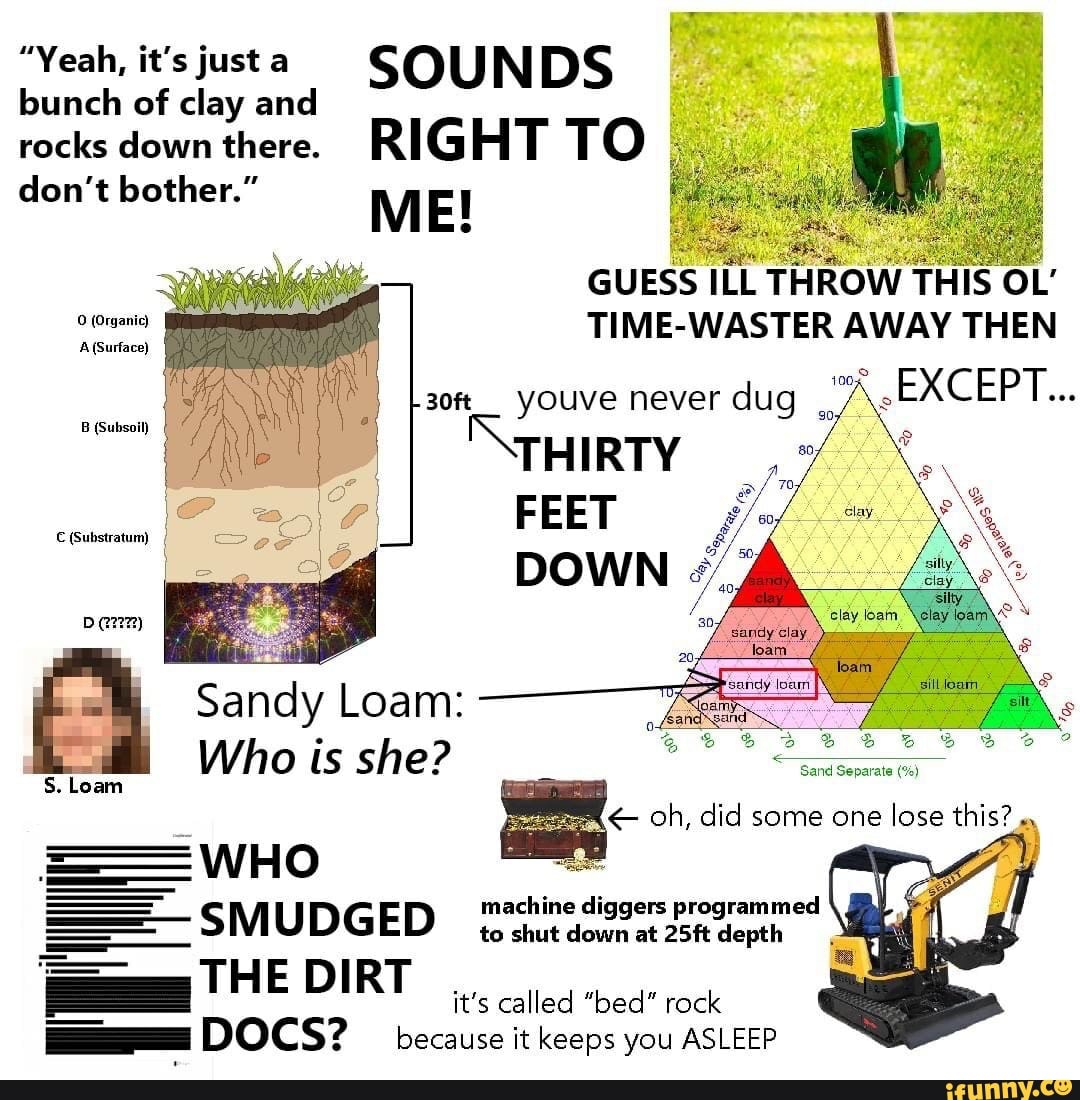I know that triangle because of Dwarf Fortress
Dig dig dig
For the people who have trouble reading this chart, I skillfully tried to draw how to read it.
https://fedia.io/media/6f/2c/6f2cffd115c4699b72589a753ebd618a0b818eeb53c28300cc808e69a945786d.jpg
Sorry, I'm illiterate.
if yous illiterate yeh, ows you earin en? euh?
If I print this off and put it up in the Earth science department, will it start a war?
Probably not. I've seen this chart in multiple geotech companies. It probably gets pointed at a lot when another contractor goes "but this is obviously sand!"
I'm a Sandy Loam truther.

How the hell am I supposed to read this chart? I picked a spot and got a total of 140%, that's too much soil!
The lines to follow are the ones at the angle that the little arrow points. Which is 'down and to the right' from each side if you put that side on top
Ternary plots (aka Triangle plots) have three axes rotated and layered on top of each other. So when you get a point like this:

You read it as 50% of the way up the clay direction:

30% of the way up the sand direction:

20% of the way up the silt direction:

So it is 50% clay, 30% sand, and 20% silt.
You're the greatest
pick a junction, follow the line to the left, the top right one and the bottom right one
Who is Sandy Loam, and why can't I reach her?
You need longer arms.
Somehow I'm bothered that Sandy Clay Loam and Silty Clay Loam are both a thing, but Loam is already the "Silty Sandy Low-Clay Loam" and a the middle-most area is "Clay Loam" instead of pure loam. WHY IS CLAY'S POWER SO GREAT!?
Is this what keeps the soil kingdoms in balance? The two rivals, silt and sand, locked in eternal hatred and yet forced to cooperate to maintain balance against the all consuming Clay Empire?
Areas with loam touch all three sides. So... Some kind of loam exists without sand, some without clay and some without silt. I am not a soil scientist but I'd guess that any substance that contains neither is a kind of loam.
Not a gardener huh?
I love it when you talk dirty to me
It's confusing that Sandy Loam and Loamy Sand are two distinctly different things.
Dirty water vs. watery dirt.
One is dirty water, the other we'd probably call mud.
To me, the difference is that one is mostly loam with a bit of sand and the other is mostly sand with a bit of loam.
Red orange vs Orange Red.
Man I've gone my whole career without ever dealing with this BS. We use USCS. One time my boss had to deal with it because of some permitting shenanigans with an agency (USDA?) and he said it was stupid.
It makes more sense if you use it as intended. It's designed to be a simple way for farmers/gardeners to classify the basic soil composition by particle size.
Take a cup of dirt, put it in a mason jar, fill it full of water, put a lid on tight and shake the hell out of it. Come back in 3-4 days and measure the layers.
This comes in helpful in applying pesticides and basic water management. It's pretty much pointless for anything else.
I'm going to try this with some dirt and see if I can identify what the dirt is made of that easily or not.
Wait is dirt triangle a lie?
Why does dirt triangle add up to >100% at all points
Because you need the follow the arrow directions and not just pick them randomly
Cause you're bad at reading charts
Who the hell is Sandy Loam?
Me playing Dwarf Fortress:
What's cool is that I have no idea what the fuck that graphic means, but it's still hilarious because the arcane nature of it makes sense in context.
That is good memeing
I can't ever see that chart without thinking of Dwarf Fortress.
Is loam normal dirt?
Science Memes
Welcome to c/science_memes @ Mander.xyz!
A place for majestic STEMLORD peacocking, as well as memes about the realities of working in a lab.

Rules
- Don't throw mud. Behave like an intellectual and remember the human.
- Keep it rooted (on topic).
- No spam.
- Infographics welcome, get schooled.
This is a science community. We use the Dawkins definition of meme.
Research Committee
Other Mander Communities
Science and Research
Biology and Life Sciences
- !abiogenesis@mander.xyz
- !animal-behavior@mander.xyz
- !anthropology@mander.xyz
- !arachnology@mander.xyz
- !balconygardening@slrpnk.net
- !biodiversity@mander.xyz
- !biology@mander.xyz
- !biophysics@mander.xyz
- !botany@mander.xyz
- !ecology@mander.xyz
- !entomology@mander.xyz
- !fermentation@mander.xyz
- !herpetology@mander.xyz
- !houseplants@mander.xyz
- !medicine@mander.xyz
- !microscopy@mander.xyz
- !mycology@mander.xyz
- !nudibranchs@mander.xyz
- !nutrition@mander.xyz
- !palaeoecology@mander.xyz
- !palaeontology@mander.xyz
- !photosynthesis@mander.xyz
- !plantid@mander.xyz
- !plants@mander.xyz
- !reptiles and amphibians@mander.xyz
Physical Sciences
- !astronomy@mander.xyz
- !chemistry@mander.xyz
- !earthscience@mander.xyz
- !geography@mander.xyz
- !geospatial@mander.xyz
- !nuclear@mander.xyz
- !physics@mander.xyz
- !quantum-computing@mander.xyz
- !spectroscopy@mander.xyz
Humanities and Social Sciences
Practical and Applied Sciences
- !exercise-and sports-science@mander.xyz
- !gardening@mander.xyz
- !self sufficiency@mander.xyz
- !soilscience@slrpnk.net
- !terrariums@mander.xyz
- !timelapse@mander.xyz

